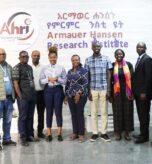
Written by Steve Bicko Cygu and Christine Ger Ochola
Artificial Intelligence (AI) is rapidly transforming industries around the world, and the field of public health is no exception. With the emergence of advanced tools and techniques, AI is redefining how healthcare systems approach disease prevention, diagnosis, treatment, and management. These innovations are improving the efficiency and accuracy of healthcare delivery while offering new ways to address persistent public health challenges.
The Data Science Without Borders (DSWB) project is integrating AI into public health efforts across African countries, including Kenya, Cameroon, Ethiopia, and Senegal. By applying AI in real-world settings, the project aims to improve health outcomes through timely data analysis, disease prediction, and strengthened surveillance systems. This blog explores how AI is shaping the future of public health within the DSWB pathfinder institutions.
One of the foundational innovations being adopted is federated learning, a machine learning approach that enables the training of AI models without requiring the transfer of sensitive health data to a central server. Instead, institutions develop models locally while sharing insights collaboratively. This approach respects privacy and ensures data security, allowing partners to co-create AI models for predicting diseases and analyzing health outcomes without compromising confidentiality.
In addition, the DSWB project addresses the challenge of fragmented health data by using AI-driven tools for integration and harmonization. Many African healthcare systems operate in silos, with data stored in various formats and locations. AI methods are used to clean, align, and standardize datasets across institutions in participating countries, enabling better decision-making through accurate, comprehensive insights. Visualization tools powered by AI further aid interpretation, making it easier for researchers and policymakers to act on the findings.
Transparency in AI decision-making is another critical aspect. Public health decisions often have direct impacts on communities, so it’s vital that AI tools offer interpretability. This is achieved through explainable AI (XAI), which allows users to understand how models arrive at predictions. Within the DSWB project, XAI supports trust and accountability, particularly in areas such as disease risk assessment and outbreak forecasting. By offering transparency, these tools empower healthcare professionals to make informed decisions with confidence.
The project is also exploring the potential of generative AI, particularly generative pre-trained transformers (GPTs), in creating health reports, simulating scenarios, and developing localized health messages. These models can help automate documentation, generate region-specific communication materials, and support proactive responses to potential health threats. The ability to produce culturally relevant and accessible content can enhance community engagement and improve the impact of health education campaigns.
To make AI more accessible to non-technical users, DSWB incorporates no-code platforms that allow users to design and deploy AI models through simple graphical interfaces. These platforms remove the barrier of needing programming knowledge, enabling healthcare professionals and public health officials to engage directly with AI tools. Tools like the I-DAIR no-code platform are already making it easier for partner institutions to build their own AI solutions, promoting wider use of data-driven approaches in health systems.
AI also plays a critical role in predictive analytics, using historical and real-time data to identify trends and forecast disease outbreaks. By analyzing patterns from past cases, machine learning algorithms can alert health authorities to potential risks, allowing for earlier intervention and better resource allocation. These predictive models consider a range of variables, including socioeconomic conditions, environmental exposures, and behavioral risk factors, helping to pinpoint high-risk populations.
In addition to prediction, AI contributes to the personalization of healthcare. Algorithms can process data from genetic profiles, medical histories, and lifestyle behaviors to tailor treatments to individual patients. This is especially important in managing non-communicable diseases like diabetes, hypertension, and cardiovascular conditions, which are increasingly prevalent across Africa. Personalized treatment guided by AI can improve patient outcomes, reduce adverse effects, and ensure that the right interventions reach the right people at the right time.
Another growing application of AI in Africa is in remote health monitoring and telemedicine. With increased access to mobile devices and wearable technologies, AI can analyze health indicators in real time, enabling continuous care even in hard-to-reach areas. Telemedicine platforms enhanced by AI are making it possible for patients to consult with healthcare providers remotely, reducing travel burdens and improving access to timely medical advice.
These applications show that AI is not a distant innovation but rather a present answer with the potential for improving public health in Africa. The DSWB project deploys artificial intelligence to solve real-world problems, construct resilient health systems, and enhance inclusive and informed decision-making. The work being done in Kenya, Cameroon, Ethiopia, and Senegal showcases how AI can potentially be used responsibly, ethically, and effectively to improve health outcomes across the continent.
As Africa continues to embrace digital transformation, the integration of AI into public health is a major step forward. Initiatives like DSWB, which invest in tools that improve cooperation, protect data privacy, and promote transparency, are paving the way for a more equitable, data-driven healthcare future.










